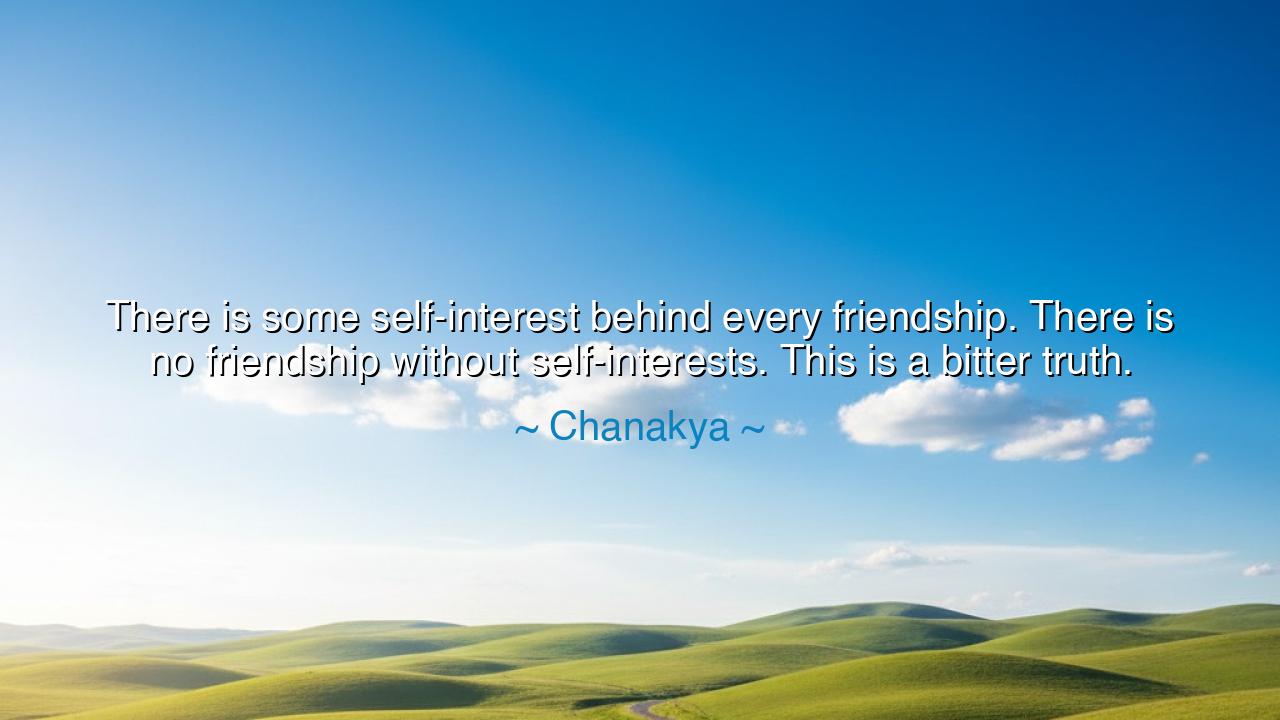
There is some self-interest behind every friendship. There is no
There is some self-interest behind every friendship. There is no friendship without self-interests. This is a bitter truth.






Chanakya, the ancient sage and master of statecraft, once spoke with piercing clarity: “There is some self-interest behind every friendship. There is no friendship without self-interests. This is a bitter truth.” His words, though sharp as the edge of a blade, were not born of cynicism but of wisdom — the wisdom that sees human nature as it is, not as we wish it to be. For Chanakya, the great teacher of kings and the mind behind the Mauryan Empire, truth was never to be softened for comfort. He saw that beneath even the noblest bonds lies the current of self-interest, subtle or open, shaping human ties like an unseen river beneath the earth.
The origin of this saying lies in the Arthashastra, Chanakya’s monumental treatise on politics, governance, and human behavior. Living in an age of betrayal and ambition, he learned to observe people not through emotion but through understanding. He was no enemy of friendship — rather, he believed that to navigate the world wisely, one must recognize its hidden motives. In his philosophy, self-interest is not evil in itself; it is the natural law of survival. Even kindness, he observed, often springs from desire — the desire to belong, to protect, to be loved, or to find peace. Thus, he called this truth “bitter,” for though it wounds the heart, it awakens the mind.
To grasp his meaning, we must first understand what he meant by friendship. In the purest sense, friendship is the meeting of two souls who find comfort and understanding in one another. Yet even here, Chanakya reminds us, the bond does not exist in a void. One seeks companionship to ease loneliness, wisdom to guide decisions, or loyalty to strengthen the spirit. The affection is real, but it is also shaped by need. It is a mutual exchange — not always of wealth or advantage, but of emotional or moral sustenance. Thus, self-interest is not always selfishness; it is the foundation upon which even noble relationships stand.
Consider the ancient story of Krishna and Arjuna from the Mahabharata. Their friendship was bound by love, loyalty, and respect, yet beneath it ran the thread of purpose. Arjuna sought Krishna’s guidance, his wisdom in the hour of moral confusion; Krishna, in turn, needed Arjuna to fulfill the divine plan, to restore righteousness through war. Each needed the other — not out of greed, but out of destiny. Their friendship was not diminished by this mutual interest; rather, it was sanctified by it. Chanakya would say that this is the higher form of self-interest — when both gain not merely for themselves, but for the greater good.
Still, the sage warns us of false friendship — those forged not in mutual respect, but in deceit. There are those who smile when fortune shines upon you, yet vanish when the sun sets. Such companions are the shadowy reflections of true friendship, built not upon love or virtue, but upon advantage alone. To mistake such ties for loyalty is to invite ruin. Chanakya’s bitter truth thus serves as both caution and compass: see the interests behind each bond, and judge them not by their sweetness, but by their sincerity. The wise man discerns the difference between friendship rooted in virtue and friendship rooted in greed.
But though his words seem stern, Chanakya does not command us to live lovelessly or distrust all hearts. Rather, he invites us to see clearly — to understand that friendship, like all things human, is shaped by motive, yet can still be beautiful. To know that self-interest exists is not to destroy affection, but to purify it. It allows us to give freely, without illusion, and to choose companions who elevate rather than exploit. The awakened soul knows that every bond contains an exchange, but the exchange can be sacred — of wisdom for comfort, of loyalty for love, of kindness for peace.
So, my children of discernment, take this teaching not as a call to coldness, but as a call to clarity. Examine your friendships and ask: what do I give, and what do I seek? If the answer lies in virtue — in helping one another grow, in standing together through both loss and gain — then that friendship, though touched by self-interest, is still pure. But if the bond lives only in times of benefit, then let it fade like mist before the sun.
For Chanakya’s wisdom is this: that truth, however bitter, can become a source of strength. Understand the motives that move men, and you will neither be deceived by flattery nor disillusioned by loss. Be grateful for those who stand by you honestly — even if they, like you, are moved by need. For to find even a few companions whose self-interest aligns with goodness, whose loyalty endures beyond profit — that, indeed, is the rarest treasure of all.






AAdministratorAdministrator
Welcome, honored guests. Please leave a comment, we will respond soon